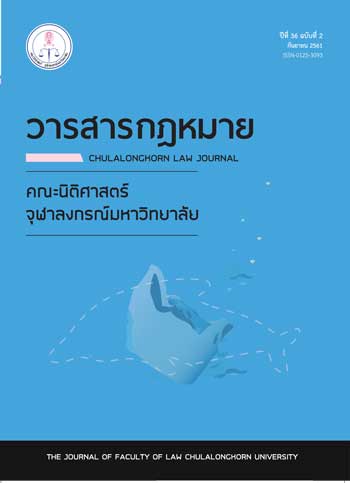ความผิดเกี่ยวกับบัตรอิเล็กทรอนิกส์ตามประมวลกฎหมายอาญา
Main Article Content
บทคัดย่อ
การศึกษาวิจัยความผิดเกี่ยวกับบัตรอิเล็กทรอนิกส์ตามประมวลกฎหมายอาญาฉบับนี้ เป็นการวิจัยเอกสาร โดยมีวัตถุประสงค์ในการศึกษาวิจัย เพื่อ 1. ศึกษาความผิดเกี่ยวกับบัตรอิเล็กทรอนิกส์ ตามหมวด 4 ลักษณะ 7 ภาค 2 ของประมวลกฎหมายอาญาและคำพิพากษาศาลฎีกา และสร้างกรณีศึกษาขึ้นใช้สำหรับการเรียนการสอนของสาขาวิชานิติศาสตร์ มหาวิทยาลัยสุโขทัยธรรมาธิราช ในระดับปริญญาตรีและปริญญาโท 2. วิเคราะห์ข้อบกพร่องต่างๆ ของบทบัญญัติกฎหมายเกี่ยวกับบัตรอิเล็กทรอนิกส์ 3. วิเคราะห์สภาพการบังคับใช้กฎหมาย และ 4. เสนอแนะการปรับปรุงกฎหมายเพื่อผลการบังคับใช้กฎหมายให้มีประสิทธิภาพมากขึ้น จากการศึกษาวิจัยพบว่า บทบัญญัติของกฎหมายว่าด้วยความผิดเกี่ยวกับบัตรอิเล็กทรอนิกส์ตามประมวลกฎหมายอาญาไม่ครอบคลุมการกระทำที่ก่อให้เกิดความเสียหายเกี่ยวกับบัตรอิเล็กทรอนิกส์ และลักษณะการกระทำความผิดที่เกี่ยวกับบัตรอิเล็กทรอนิกส์บางลักษณะไม่สามารถปรับบทความผิดเกี่ยวกับบัตรอิเล็กทรอนิกส์ได้ ยังคงต้องอาศัยกฎหมายเก่าที่มีอยู่ก่อนมีการแก้ไขเพิ่มเติมประมวลกฎหมายอาญาเกี่ยวกับบัตรอิเล็กทรอนิกส์ปรับใช้แก่การกระทำลักษณะนั้นๆ และยังพบอีกว่ามีกฎหมายบางฉบับที่แม้ไม่มีวัตถุประสงค์มุ่งคุ้มครองบัตรอิเล็กทรอนิกส์โดยตรง แต่นำมาปรับใช้อาศัยการตีความกฎหมายหรือปรับบทบังคับใช้แก่กรณี หากแต่การกระทำบางกรณีไม่สามารถปรับบทกฎหมายแก่ผู้กระทำได้ ก่อให้เกิดปัญหาช่องว่างแห่งกฎหมายอาญา ผลจากการศึกษาวิจัยจึงมีข้อเสนอแนะ คือ ด้านบทบัญญัติของกฎหมาย ด้วยการแก้ไขเพิ่มเติมบทนิยามและฐานความผิดเกี่ยวกับบัตรอิเล็กทรอนิกส์ตามประมวลกฎหมายอาญา
Article Details
ลิขสิทธิ์และเนื้อหาในเว็บไซต์ของวารสารกฎหมาย (รวมถึง โดยไม่จำกัดเฉพาะ เนื้อหา รหัสคอมพิวเตอร์ งานศิลป์ ภาพถ่าย รูปภาพ ดนตรีกรรม โสตทัศนวัสดุ) เป็นกรรมสิทธิ์ของวารสารกฎหมาย และผู้ได้รับการโอนสิทธิทุกราย
1. วารสารกฎหมาย ให้อนุญาตให้คุณใช้สิทธิอันไม่เฉพาะเจาะจงที่สามารถถูกถอนเมื่อใดก็ได้ โดยไม่มีค่าใช้จ่าย ในการ
- เยี่ยมชมเว็บไซต์และเอกสารในเว็บไซต์นี้ จากคอมพิวเตอร์หรือเครื่องมือสื่อสารผ่านเว็บบราวเซอร์
- คัดลอกและจัดเก็บเว็บไซต์และเอกสารในเว็บไซต์นี้บนลงคอมพิวเตอร์ของคุณผ่านระบบความจำ cache
- สั่งพิมพ์เอกสารจากเว็บไซต์นี้สำหรับการใช้ส่วนตัวของคุณ
- ผลงานที่ได้รับการตีพิมพ์โดยวารสารกฎหมาย จุฬาลงกรณ์มหาวิทยาลัย ถูกคุ้มครองภายใต้ Creative Commons Attribution 4.0 International License ซึ่งอนุญาตให้ทุกคนสามารถคัดลอก แจกจ่าย ดัดแปลง ส่งต่อ ผลงานได้ ก็ต่อเมื่อผลงานและแหล่งข้อมูลได้รับการอ้างอิงอย่างเหมาะสม
2. วารสารกฎหมาย จุฬาลงกรณ์มหาวิทยาลัย สงวนสิทธิ์ไม่อนุญาตให้คุณใช้สิทธิอื่นใดที่เกี่ยวข้องกับเว็บไซต์และเอกสารบนเว็บไซต์นี้ เช่น การคัดลอก ดัดแปลง เปลี่ยนแปลง ส่งต่อ ตีพิมพ์ แจกจ่าย เผยแพร่ จัดแสดงในที่สาธารณะ ไม่ว่าจะในรูปแบบใดก็ตาม ซึ่งเว็บไซต์หรือเอกสารบนเว็บไซต์ โดยไม่อ้างอิงถึงแหล่งข้อมูลหรือโดยไม่ได้รับอนุญาตเป็นลายลักษณ์อักษรจากวารสารกฎหมาย จุฬาลงกรณ์มหาวิทยาลัย
3. คุณอาจขออนุญาตที่จะใช้เอกสารอันมีลิขสิทธิ์บนเว็บไซต์นี้โดยการเขียนอีเมลล์มายัง journal@law.chula.ac.th
4. วารสารกฎหมาย จุฬาลงกรณ์มหาวิทยาลัย เข้มงวดกับการคุ้มครองลิขสิทธิ์อย่างมาก หากวารสารกฎหมาย จุฬาลงกรณ์มหาวิทยาลัยพบว่าคุณได้ใช้เอกสารอันมีลิขสิทธิ์บนเว็บไซต์นี้โดยไม่ถูกต้องตามการอนุญาตให้ใช้สิทธิ ดังที่กล่าวไปข้างต้น วารสารกฎหมาย จุฬาลงกรณ์มหาวิทยาลัยอาจดำเนินคดีตามกฎหมายต่อคุณได้ เพื่อเรียกร้องค่าเสียหายที่เป็นตัวเงินและคำขอชั่วคราวให้คุณหยุดการใช้เอกสารดังกล่าว ทั้งนี้ คุณอาจถูกสั่งให้ชดใช้ค่าใช้จ่ายใดๆ ที่เกี่ยวข้องกับการดำเนินการตามกฎหมายนี้
หากคุณพบเห็นการใช้เอกสารอันมีลิขสิทธิ์ของวารสารกฎหมาย จุฬาลงกรณ์มหาวิทยาลัย ที่ขัดหรืออาจขัดต่อการอนุญาตให้ใช้สิทธิดังที่ได้กล่าวไปข้างต้น โดยเชื่อว่าได้ละเมิดลิขสิทธิ์ของคุณหรือของผู้อื่น สามารถร้องเรียนมาได้ที่ journal@law.chula.ac.th


